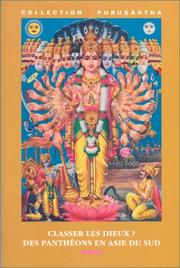| Listing 1 - 10 of 36 | << page >> |
Sort by
|
Book
ISBN: 1554412188 Year: 2002 Publisher: Chicoutimi : J.-M. Tremblay,
Abstract | Keywords | Export | Availability | Bookmark
 Loading...
Loading...Choose an application
- Reference Manager
- EndNote
- RefWorks (Direct export to RefWorks)
Book
ISBN: 155441539X Year: 2002 Publisher: Chicoutimi : J.-M. Tremblay,
Abstract | Keywords | Export | Availability | Bookmark
 Loading...
Loading...Choose an application
- Reference Manager
- EndNote
- RefWorks (Direct export to RefWorks)
Book
ISBN: 1554415306 Year: 2002 Publisher: Chicoutimi : J.-M. Tremblay,
Abstract | Keywords | Export | Availability | Bookmark
 Loading...
Loading...Choose an application
- Reference Manager
- EndNote
- RefWorks (Direct export to RefWorks)
Book
Year: 1963 Publisher: [Chicago] : University of Chicago Press,
Abstract | Keywords | Export | Availability | Bookmark
 Loading...
Loading...Choose an application
- Reference Manager
- EndNote
- RefWorks (Direct export to RefWorks)
Book
Year: 2017 Publisher: Paris cedex 14 (Humensis 170 bis, boulevard du Montparnasse 75680) : Presses Universitaires de France,
Abstract | Keywords | Export | Availability | Bookmark
 Loading...
Loading...Choose an application
- Reference Manager
- EndNote
- RefWorks (Direct export to RefWorks)
Dans ce classique de la sociologie de la connaissance, Durkheim et Mauss proposent de réécrire la table kantienne des catégories : l'acquisition de nos concepts fondamentaux et la maîtrise des jugements logiques qu'ils rendent possibles ne sont pas, selon eux, le fruit des seules forces de l'individu, mais ont en fait une origine sociale. Cette hypothèse, ils la testent sur les concepts de genres et espèces. Ils entendent ainsi établir qu'en Amérique du Nord, chez les aborigènes d'Australie, tout autant que dans le système divinatoire chinois, stratification sociale et genres naturels primitifs se font écho : la classification des choses reproduit celle des hommes. Ce faisant, Durkheim et Mauss suggèrent qu'il y a continuité entre la faculté de classification déployée dans les sociétés primitives et celle à l'œuvre dans nos sciences contemporaines – belle et généreuse manière de mettre en cause le Grand Partage.
Book
ISBN: 9782130606710 2130606717 Year: 2017 Volume: 2 Publisher: Paris: PUF,
Abstract | Keywords | Export | Availability | Bookmark
 Loading...
Loading...Choose an application
- Reference Manager
- EndNote
- RefWorks (Direct export to RefWorks)
Dans ce classique de la sociologie de la connaissance, Durkheim et Mauss proposent de réécrire la table kantienne des catégories : l’acquisition de nos concepts fondamentaux et la maîtrise des jugements logiques qu’ils rendent possibles ne sont pas, selon eux, le fruit des seules forces de l’individu, mais ont en fait une origine sociale. Cette hypothèse, ils la testent sur les concepts de genres et espèces. Ils entendent ainsi établir qu’en Amérique du Nord, chez les aborigènes d’Australie, tout autant que dans le système divinatoire chinois, stratification sociale et genres naturels primitifs se font écho : la classification des choses reproduit celle des hommes. Ce faisant, Durkheim et Mauss suggèrent qu’il y a continuité entre la faculté de classification déployée dans les sociétés primitives et celle à l’œuvre dans nos sciences contemporaines – belle et généreuse manière de mettre en cause le Grand Partage.
Book
ISBN: 1554412196 Year: 2002 Publisher: Chicoutimi : J.-M. Tremblay,
Abstract | Keywords | Export | Availability | Bookmark
 Loading...
Loading...Choose an application
- Reference Manager
- EndNote
- RefWorks (Direct export to RefWorks)
Folk classification. --- Aboriginal Australians. --- Ethnology
Book
ISBN: 0520377346 9780520377349 Year: 1981 Publisher: Berkeley : University of California Press,
Abstract | Keywords | Export | Availability | Bookmark
 Loading...
Loading...Choose an application
- Reference Manager
- EndNote
- RefWorks (Direct export to RefWorks)
This simulating book gathers five lectures that ask questions of the broadest general intellectual interest: What is religion? Do other peoples have the same emotional states as we do? Why do humans make use of body imagery? In Circumstantial Deliveries, Rodney Needham shows that the comparative study of societies may furnish the answers. Circumstantial Deliveries challenges the methodology and substance of many conventional ideas about human nature and calls for more radical and comparative analyses. For instance, the author discredits the notion that to primitive peoples the colors red, white, and black symbolize blood, semen, and feces, respectively, arguing that an extensive comparative study of primitive societies discovered no such relationship. These essays sound a common theme: "If a deeper appreciation of the value of life can be had from reading Crime and Punishment, or if a more acute assessment of the springs of action can be acquired from Hamlet, then in principle it should be conceded that like benefits may be derived from a sympathetic observation of other men engaged in their daily affairs." This title is part of UC Press's Voices Revived program, which commemorates University of California Press's mission to seek out and cultivate the brightest minds and give them voice, reach, and impact. Drawing on a backlist dating to 1893, Voices Revived makes high-quality, peer-reviewed scholarship accessible once again using print-on-demand technology. This title was originally published in 1981.
Ethnology --- Folk classification. --- Ethnopsychology. --- Philosophy.

ISBN: 2713209978 9782713209970 2713231345 Year: 1993 Publisher: Paris: École des hautes études en sciences sociales,
Abstract | Keywords | Export | Availability | Bookmark
 Loading...
Loading...Choose an application
- Reference Manager
- EndNote
- RefWorks (Direct export to RefWorks)
Folk classification --- Polytheism --- Gods, Hindu --- South Asia

ISBN: 9780415318273 0415318270 Year: 2004 Publisher: London: Routledge,
Abstract | Keywords | Export | Availability | Bookmark
 Loading...
Loading...Choose an application
- Reference Manager
- EndNote
- RefWorks (Direct export to RefWorks)
Ranging from issues of taxonomy and naming to the fascinating subject of birds' prophetic associations and their places in religious representations, myth, poetry and song, Gregory Forth's richly detailed work will be invaluable to students of ethnobiology, social and cultural anthropology, folklore, zoology and Southeast Asia."--Jacket. "This book describes in detail the relationship between the Nage people of eastern Indonesia and the birds whose environment they share. Based on more than a decade of ethnographic fieldwork, it explores the ways in which a human society interacts with members of another zoological class and attaches particular values to these in a variety of cultural and conceptual contexts. As well as a fascinating study of the local ornithology of the Indonesian island of Flores, Nage Birds provides a critical review of current theoretical debate regarding how non-western societies categorize and think about non-human forms of animal life.
| Listing 1 - 10 of 36 | << page >> |
Sort by
|

 Search
Search Feedback
Feedback About UniCat
About UniCat  Help
Help News
News